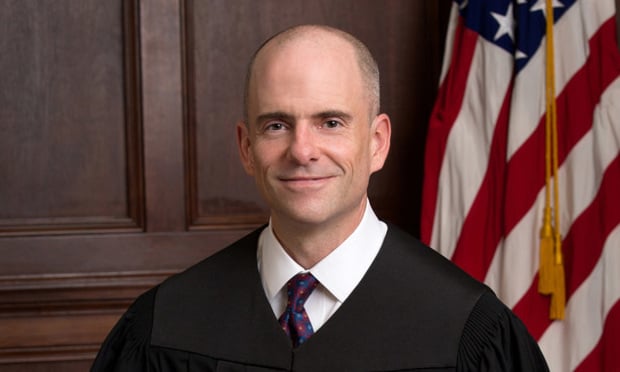Judge Newsom Finds Foul Odor in 11th Circuit Land-Use Case
“What happened to Hillcrest here was pretty doggone s[tink]y,” Judge Kevin Newsom wrote. But he agreed with Judge Gerald Tjoflat that foul smelling does not equal unconstitutional.
February 15, 2019 at 02:43 PM
6 minute read
 Judge Kevin Newsom, U.S. Court of Appeals for the Eleventh Circuit. (Courtesy photo)
Judge Kevin Newsom, U.S. Court of Appeals for the Eleventh Circuit. (Courtesy photo)
“Not everything that s[tink]s violates the Constitution,” Judge Kevin Newsom of the U.S. Court of Appeals for the Eleventh Circuit said in a special concurrence for a Florida due process opinion that's generating #AppellateTwitter buzz. “If ever a case proved the truth of that little nugget, this is it.”
Newsom said he was borrowing a 20-year-old quote from “an insightful (and hilarious) lawyer friend.”
“And because this is a family show, I'll clean it up a bit,” the judge said.
Newsom used his concurrence to highlight issues while still agreeing with Judge Gerald Tjoflat, who was also joined by Judge Stanley Marcus.
Georgia Court of Appeals Judge Stephen Dillard flagged the ruling for his 15,000 Twitter followers. “I think Judge Kevin Newsom's latest opinion, a special concurrence, will be of some interest to #AppellateTwitter and many of my law professor friends,” Dillard tweeted Wednesday evening after the opinions posted online.
Over the next day or so, the tweet generated kind comments—true to Dillard's Twitter style—though one complained of too many dashes. Mostly they deemed Newsom's writing great, impressive and enjoyable, while finding amusement in their own late-night reading preferences.
But first, Tjoflat set the stage.
“The question before us is whether a litigant in this Circuit has a substantive-due-process claim under the Due Process Clause of the Fourteenth Amendment when the alleged conduct is the unlawful application of a land-use ordinance,” Tjoflat wrote. “The answer to that question is a resounding 'no'—an answer that this Court delivered in McKinney v. Pate, 20 F.3d 1550 (11th Cir. 1994) (en banc), 24 years ago and has reaffirmed ever since.”
Tjoflat would know, having served on the court since 1975—and having written the McKinney opinion in 1994.
“We held in McKinney that executive action never gives rise to a substantive-due-process claim unless it infringes on a fundamental right,” Tjoflat said. “A land-use decision is classic executive, rather than legislative, action—action that, at least here, does not implicate a fundamental right under the Constitution.”
The appeal from the U.S. District Court for the Middle District of Florida is about a dispute between Hillcrest Property and Pasco County.
The ordinance in question aimed “to protect transportation corridors from encroachment” by development, Tjoflat said. The land at issue is that which the county deems “required to adequately provide transportation,” no matter who owns it. When a developer seeks a permit, the county requires a right-of-way dedication as a condition.
Hillcrest Property owns 16.5 acres of undeveloped, commercially-zoned land in Pasco County. In December 2006, Hillcrest applied to the county to develop its property with a 83,000-square-foot retail shopping center and three commercial spaces. Just over one year later, in February 2007, the county notified Hillcrest that it would require the dedication of 50 feet for the future development of State Road 52 into four lanes. A few months later, in May, the county told Hillcrest it would require a dedication of an additional 90 feet, bringing the total to 140 feet. The county was to compensate Hillcrest for these additional 90 feet, but then years later said it was unable to pay, Tjoflat said.
Hillcrest sued the county, alleging violations of the Takings Clause of the Fifth Amendment, as incorporated by the Fourteenth Amendment. The company also made due process claims under the Fourteenth Amendment.
The trial court granted summary judgment on some of Hillcrest's claims, but not others, and enjoined the county from taking the land. The county appealed. “We accordingly vacated the District Court's order but expressed 'no view as to the merits of Hillcrest's pending as-applied substantive due process claim',” Tjoflat said. “The litigation continued.”
Now, Tjoflat said, “we must decide the one claim that lingers and put this case to rest.” That would be the due process claim. Tjoflat went on another dozen pages or so about that, explaining why he found it lacking.
“We cannot be clearer on this point: regardless of how arbitrarily or irrationally the County has acted with respect to Hillcrest, Hillcrest has no substantive-due-process claim,” Tjoflat concluded. He reversed the district court's grant of summary judgment to Hillcrest.
“What happened to Hillcrest here was pretty doggone s[tink]y,” Newsom wrote in his special concurrence, again quoting his old friend mentioned earlier. The county was demanding 196,000 square feet of land—4.5 acres, more than a quarter of Hillcrest's total parcel.
“Over the course of the next few years, the parties continued to haggle, the county continued to deny Hillcrest's construction permits, and Hillcrest—presumably feeling like it was trapped in some Ayn-Rand-ian nightmare—eventually sued,” Newsom said.
Newsom also went on for more than 20 pages analyzing constitutional law and prior relevant decisions, saying he went with the majority by a different path.
“To be clear, I think the majority has it exactly right under our existing precedent,” Newsom said. “I'm just not convinced that our precedent has it exactly right.”
Hillcrest was represented by David Smolker and Ethan Loeb of Smolker Bartlett Loeb Hinds & Thompson in Tampa. Smolker said the team is considering an appeal.
“The 11th circuit's opinion essentially says that if a county commission passes legislation that authorizes extortionate leveraging of the police power to acquire property it would otherwise have to pay for, the landowner is protected by substantive due process. But if that same county's development review committee implements that same legislation by extortionately leveraging that same property, the same landowner is not so protected,” Smolker said late Friday. “This case proves the adage that the life of the law is not logic but rather experience.”
The county was represented by Donald Hemke and H. Raymond Allen II of Carlton Fields in Tampa. The county's lawyers declined to comment.
The case is Hillcrest Property v. Pasco County, No. 17-14789.
This content has been archived. It is available through our partners, LexisNexis® and Bloomberg Law.
To view this content, please continue to their sites.
Not a Lexis Subscriber?
Subscribe Now
Not a Bloomberg Law Subscriber?
Subscribe Now
NOT FOR REPRINT
© 2025 ALM Global, LLC, All Rights Reserved. Request academic re-use from www.copyright.com. All other uses, submit a request to [email protected]. For more information visit Asset & Logo Licensing.
You Might Like
View All
Why Georgia's Latest Push to Curb Lawsuits Has Business Groups and Trial Lawyers at Odds
6 minute read
Eversheds Sutherland Moving After 36 Years to Smaller Atlanta Office
4 minute read
Fowler White Burnett Opens Jacksonville Office Focused on Transportation Practice
3 minute read
Trending Stories
Who Got The Work
J. Brugh Lower of Gibbons has entered an appearance for industrial equipment supplier Devco Corporation in a pending trademark infringement lawsuit. The suit, accusing the defendant of selling knock-off Graco products, was filed Dec. 18 in New Jersey District Court by Rivkin Radler on behalf of Graco Inc. and Graco Minnesota. The case, assigned to U.S. District Judge Zahid N. Quraishi, is 3:24-cv-11294, Graco Inc. et al v. Devco Corporation.
Who Got The Work
Rebecca Maller-Stein and Kent A. Yalowitz of Arnold & Porter Kaye Scholer have entered their appearances for Hanaco Venture Capital and its executives, Lior Prosor and David Frankel, in a pending securities lawsuit. The action, filed on Dec. 24 in New York Southern District Court by Zell, Aron & Co. on behalf of Goldeneye Advisors, accuses the defendants of negligently and fraudulently managing the plaintiff's $1 million investment. The case, assigned to U.S. District Judge Vernon S. Broderick, is 1:24-cv-09918, Goldeneye Advisors, LLC v. Hanaco Venture Capital, Ltd. et al.
Who Got The Work
Attorneys from A&O Shearman has stepped in as defense counsel for Toronto-Dominion Bank and other defendants in a pending securities class action. The suit, filed Dec. 11 in New York Southern District Court by Bleichmar Fonti & Auld, accuses the defendants of concealing the bank's 'pervasive' deficiencies in regards to its compliance with the Bank Secrecy Act and the quality of its anti-money laundering controls. The case, assigned to U.S. District Judge Arun Subramanian, is 1:24-cv-09445, Gonzalez v. The Toronto-Dominion Bank et al.
Who Got The Work
Crown Castle International, a Pennsylvania company providing shared communications infrastructure, has turned to Luke D. Wolf of Gordon Rees Scully Mansukhani to fend off a pending breach-of-contract lawsuit. The court action, filed Nov. 25 in Michigan Eastern District Court by Hooper Hathaway PC on behalf of The Town Residences LLC, accuses Crown Castle of failing to transfer approximately $30,000 in utility payments from T-Mobile in breach of a roof-top lease and assignment agreement. The case, assigned to U.S. District Judge Susan K. Declercq, is 2:24-cv-13131, The Town Residences LLC v. T-Mobile US, Inc. et al.
Who Got The Work
Wilfred P. Coronato and Daniel M. Schwartz of McCarter & English have stepped in as defense counsel to Electrolux Home Products Inc. in a pending product liability lawsuit. The court action, filed Nov. 26 in New York Eastern District Court by Poulos Lopiccolo PC and Nagel Rice LLP on behalf of David Stern, alleges that the defendant's refrigerators’ drawers and shelving repeatedly break and fall apart within months after purchase. The case, assigned to U.S. District Judge Joan M. Azrack, is 2:24-cv-08204, Stern v. Electrolux Home Products, Inc.
Featured Firms
Law Offices of Gary Martin Hays & Associates, P.C.
(470) 294-1674
Law Offices of Mark E. Salomone
(857) 444-6468
Smith & Hassler
(713) 739-1250






